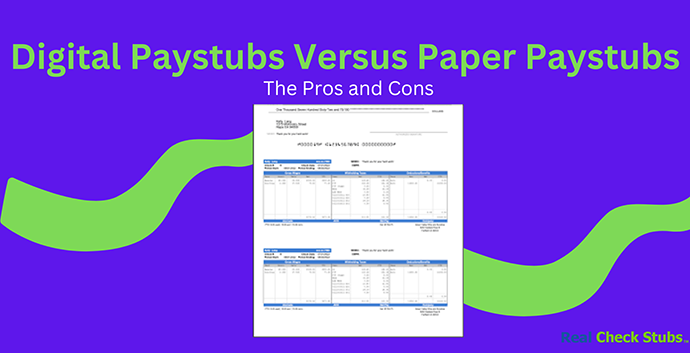In today’s digital age, businesses are increasingly shifting from paper-based processes to electronic systems, and pay stubs are no exception. The choice between paper and electronic pay stubs impacts not only employers but also employees. Understanding the pros and cons of each option can help employees decide which method best suits their needs. This article will explore the differences between paper and electronic pay stubs, weighing the benefits and drawbacks to determine which is better for employees.
1. Accessibility and Convenience
- Paper Pay Stubs:
- Pros: Paper pay stubs are tangible, easy to file, and accessible without the need for technology. Employees receive a physical copy that they can store for future reference.
- Cons: Paper pay stubs can be easily misplaced or damaged, leading to potential issues when proof of income is required. Additionally, employees must wait to receive their pay stubs through mail or in-person distribution.
- Electronic Pay Stubs:
- Pros: Electronic pay stubs offer instant access to pay information from any device with an internet connection. They are stored digitally, reducing the risk of loss or damage. Employees can easily download and print copies when needed. Additionally, understanding how to create a pay stub ensures that the process is straightforward and efficient, providing employees with accurate and accessible records.
- Cons: Accessing electronic pay stubs requires internet access and may be challenging for employees who are not tech-savvy or who lack reliable internet connections.
2. Environmental Impact
- Paper Pay Stubs:
- Pros: For those who prefer physical documents, paper pay stubs provide a traditional way to keep track of earnings without relying on digital systems.
- Cons: Producing paper pay stubs contributes to environmental waste, including the use of paper, ink, and energy for printing and distribution. Over time, the environmental footprint of paper pay stubs can add up.
- Electronic Pay Stubs:
- Pros: Electronic pay stubs are eco-friendly, eliminating the need for paper and reducing waste. They support sustainable business practices by minimizing the environmental impact of payroll processes.
- Cons: Although electronic pay stubs reduce paper waste, they still rely on energy consumption through electronic devices and data storage systems.
3. Security and Privacy
- Paper Pay Stubs:
- Pros: Paper pay stubs are private when stored securely by the employee. They are not vulnerable to cyber-attacks, hacking, or data breaches.
- Cons: Paper pay stubs can be intercepted or lost, leading to potential privacy breaches. If not stored securely, sensitive information could be accessed by unauthorized individuals.
- Electronic Pay Stubs:
- Pros: Electronic pay stubs are protected by encryption and password-protected systems, offering a higher level of security compared to paper. Employees can access their pay information securely through company portals or payroll software.
- Cons: Despite security measures, electronic pay stubs are vulnerable to cyber threats. Employees must take precautions to protect their login credentials and ensure their devices are secure.
4. Cost Implications
- Paper Pay Stubs:
- Pros: There are no direct costs for employees receiving paper pay stubs, as the employer covers printing and distribution expenses.
- Cons: The cost of producing and distributing paper pay stubs can be significant for employers, potentially leading to cost-cutting measures that affect employees.
- Electronic Pay Stubs:
- Pros: Electronic pay stubs are cost-effective for employers, as they eliminate printing and mailing expenses. These savings may be passed on to employees through improved benefits or other perks.
- Cons: While there are no direct costs for employees, some may face indirect costs, such as needing access to a printer or the internet to view or print their pay stubs.
5. Record-Keeping and Organization
- Paper Pay Stubs:
- Pros: Paper pay stubs are easy to organize in a physical filing system, allowing employees to keep track of their earnings history.
- Cons: Storing and organizing paper pay stubs can become cumbersome over time, especially for employees with limited storage space. Finding specific documents may also be time-consuming.
- Electronic Pay Stubs:
- Pros: Electronic pay stubs are easy to organize and store digitally. Employees can quickly search and retrieve specific documents without the need for physical storage.
- Cons: Relying on electronic storage requires regular backups to prevent data loss. If employees do not regularly download and save their pay stubs, they may lose access if the employer changes systems.
Final Thoughts
When deciding between paper and electronic pay stubs, it ultimately comes down to personal preference and lifestyle. For employees who value convenience, environmental sustainability, and easy access, electronic pay stubs are likely the better choice. However, for those who prefer a tangible record and may not have reliable access to digital systems, paper pay stubs might be more suitable.
Employers often offer the option to choose between paper and electronic pay stubs, so employees should consider their needs and priorities when making a decision. Regardless of the choice, understanding the benefits and potential drawbacks of each option helps employees make informed decisions that align with their preferences and lifestyle.
